Lychnis coronaria
Rose Campion
Rose Campion features small, brilliantly colored flowers set off against silvery gray leaves. Reseeds easily to extend plantings. Canopy coverage: 3 square feet.
[Read More]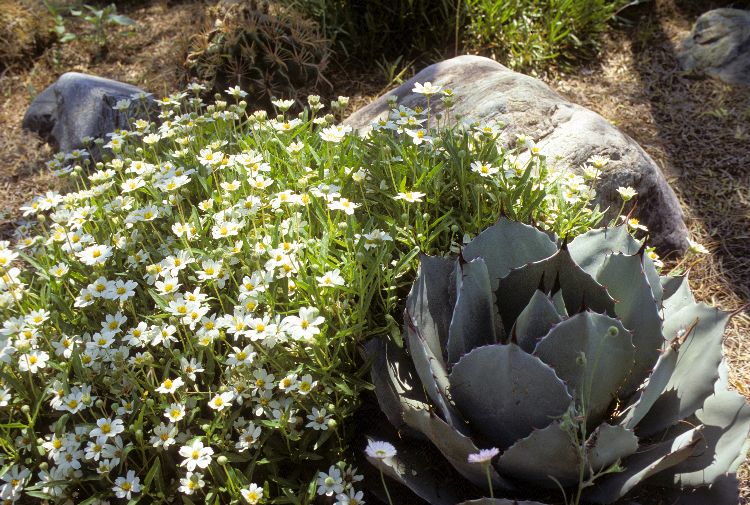
Melampodium leucanthum
Blackfoot Daisy
The growth habit of Blackfoot Daisy is a low mound. Daisylike flowers with yellow centers bloom almost year-round. Attractive planted among boulders or in rock gardens. Canopy coverage: 3 square feet.
[Read More]Monarda didyma
Scarlet Bee-Balm
Bee-Balm features tall stems lined with tufts of brightly colored, 2- to 4-inch flowers. Look for selections that are resistant to powdery mildew. Canopy coverage: 3 square feet.
[Read More]Nepeta racemosa
Catmint
This species is notorious for reseeding vigorously, so be aware plants may turn up where you don't want them. Improved selections are available; 'Walker's Low' makes a good groundcover. Also see Nepeta x faassenii, which produces sterile seeds. Canopy coverage: 3 square feet.
[Read More]Nepeta x faassenii
Faassen's Catmint
This Catmint hybrid is sterile, so does not set viable seed. It is an improved selection compared to Nepeta racemosa. Best with some protection from the sun in hot summer regions. Canopy coverage: 3 square feet.
[Read More]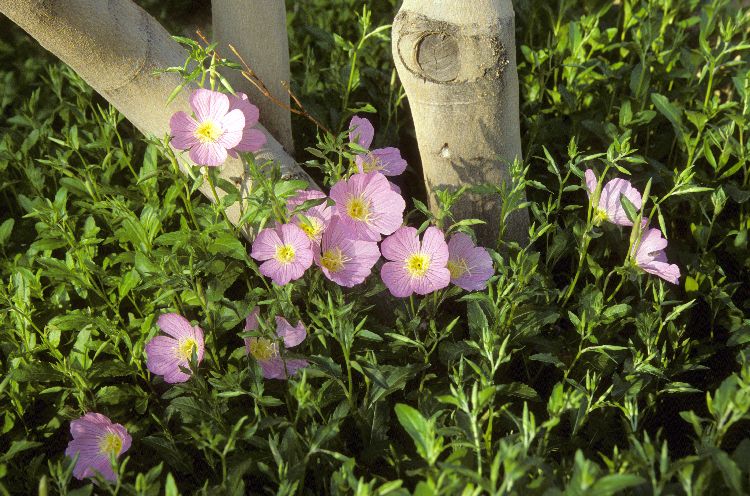
Oenothera berlandieri
Mexican Evening Primrose
The large, bright to dark pink flowers of Mexican Evening Primrose are profuse in spring. It evokes a lush, subtropical appearance. It is known to be invasive, so plant in containers or easily contained area. Freezes to the ground with cold temperatures but regrows the following spring. 'Siskiyou' is an improved selection. Canopy coverage: 13 square feet.
[Read More]Oenothera macrocarpa
Missouri Evening Primrose
Missouri Evening Primrose produces large, 4-inch flowers that are pure yellow. Flowers last only one day, but because flowering is so profuse it is hard to notice. Accepting of tough conditions. Better with afternoon shade in hottest climates. Canopy coverage: 3 square feet.
[Read More]Origanum vulgare
Common Oregano
Common Oregano, also known as Wild Marjoram, is variable regarding leaf scent and culinary flavor. Color comes from flowers as well as bracts, which are modified leaves that surround flowers. Spreads and reseeds on its own. May die down with winter cold but comes back from the roots. Useful in cooking. Canopy coverage: 7 square feet.
[Read More]Osteospermum 'Avalanche'
African Daisy, Sun Daisy
Large, 3-inch, pure white, daisy flowers are profuse on this perennial groundcover for months beginning in spring. Accepts a range of soils, even clay soil. A Plant Select plant. Canopy coverage: 3 square feet.
[Read More]
Paeonia hybrids
Peony
Peonies are long-lived plants available in a wide selection of flower colors and sizes. They make excellent cut flowers, some of which are fragrant. Plants are shrubby; tree forms are available as well. White-flowering Peony shown is 'Claire de Lune'. Canopy coverage: 7 square feet.
[Read More]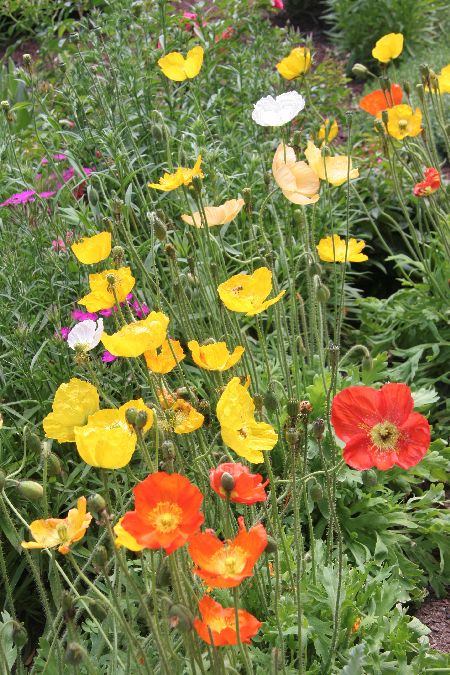
Papaver nudicaule
Iceland Poppy
The large, colorful, saucer-shaped flowers of Iceland Poppy are beauties in the garden, rising on slender stems above the mounding leaves. It is typically a short-lived perennial. Canopy coverage: 1 square foot.
[Read More]Pelargonium x hortorum
Garden Geranium
Geraniums are perennials typically grown as annuals in hot-summer or cold-winter regions. Plant from containers or packs in spring. These are old-fashioned plants that are grown as bedding plants, hanging baskets or even houseplants. Also look for scented geraniums, which are available in many rich fragrances.
[Read More]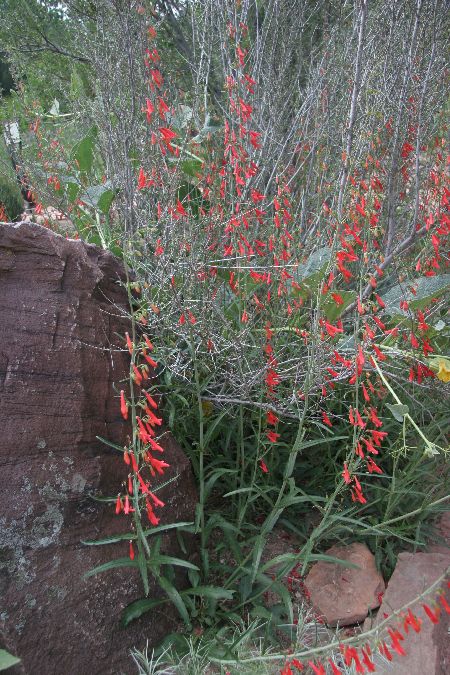
Penstemon barbatus
Scarlet Bugler
The tubular flowers of Scarlet Bugler are true scarlet in color, borne on lanky stems that are mostly leafless. Plant is open, somewhat sprawling. Long bloom period. Canopy coverage: 1 square foot.
[Read More]Penstemon barbatus 'Elfin Pink'
Elfin Pink Scarlet Bugler
Well-adapted to most regions of the U.S. Slightly smaller than the species. Accepts moist soil conditions better than other Beard Tongues. Canopy coverage: 1 square foot.
[Read More]Penstemon caespitosus
Mat Penstemon
Unlike most Penstemons, Mat Penstemon is a ground-hugging plant, growing just a few inches high. It spreads by runners, with tiny, 1/2-inch, cup-shaped leaves. Requires well drained soil. Canopy coverage: 1 square foot.
[Read More]Penstemon cyanthus
Wasatch Penstemon
This is an upright-growing Penstemon, with symmetrical spires of blue-violet flowers ringing the tall stems. Avoid providing too much water after plants are established. Canopy coverage: 3 square feet.
[Read More]Penstemon digitalis 'Husker Red'
Beard Tongue
This Penstemon puts on a show of white and sometimes soft pink flowers in late spring and into summer. Leaves are a dark maroon to purple color. Mostly trouble-free, but avoid planting in soggy soils. Canopy coverage: 3 square feet.
[Read More]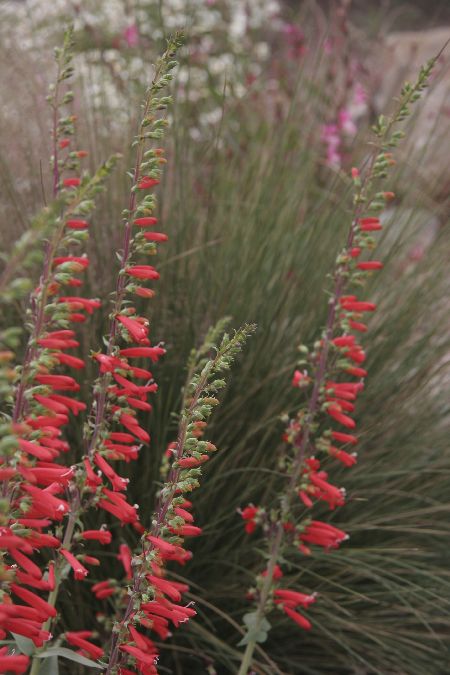
Penstemon eatonii
Firecracker Penstemon
The dramatic flowering spikes of Firecracker Penstemon are profuse in spring. Plants reseed to create a naturalistic setting. Canopy coverage: 3 square feet.
[Read More]
Penstemon grandiflorus
Shell Leaf Penstemon
Shell Leaf Penstemon produces large, soft pink, tubular flowers on tall stems. One of the best Penstemons for the Rocky Mountain region. Canopy coverage: 3 square feet.
[Read More]Penstemon linarioides
Toadflax Penstemon
Toadflax Penstemon is a low grower to less than one foot high. Leaves are narrow. Flowers form in clusters above the foliage. Drought tolerant. Canopy coverage: 1 square foot.
[Read More]Penstemon palmeri
Palmer's Penstemon
This is one of the largest Penstemons, so place it in the back of the border or combination planting. Its fragrant flowers look like large snapdragons. Well drained soil is a must. Canopy coverage: 3 square feet.
[Read More]